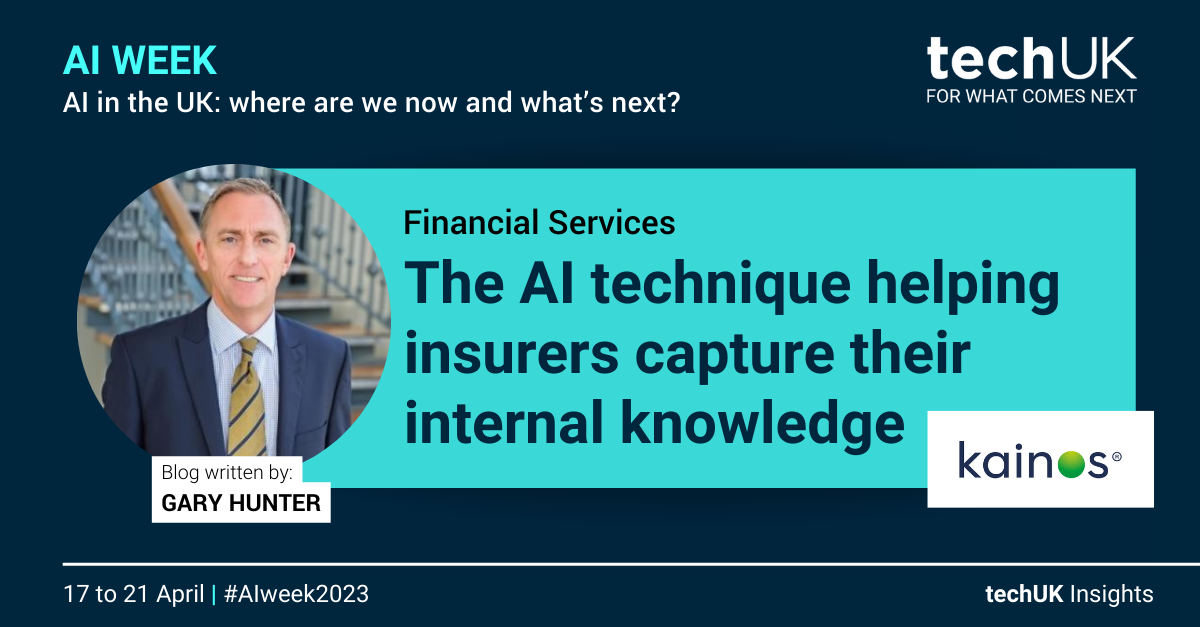The AI technique helping insurers capture their internal knowledge (Guest blog by Kainos)
AI and knowledge mining
Finding ways to innovate and doing so at speed is critical for an insurer hoping to succeed in today’s world. But according to industry analysts, 67% of organisations say that over a quarter of their full-time employees are still spending some of their day extracting information from unstructured data. One of the most significant technological innovations in the industry is Artificial Intelligence (AI). In fact, nine out of ten leading businesses have investments in AI technologies, and major players across all industries are on the journey of implementing AI as part of their broader data strategy.
Knowledge mining is an advanced AI technique that combines intelligent AI services to automatically read, understand and derive meaning from text in a variety of contexts. The technology can be trained to be particularly knowledgeable in specific domains – an essential requirement for insurance use cases. It uses a range of AI to work across different document types and formats, including images, audio files, forms, web pages, and Office documents allowing insurers to enrich their understanding of the content with cognitive skills, such as image classification, facial recognition, language detection, and key phrase extraction. Knowledge mining is also used to extract tacit knowledge from employees to protect that knowledge in the event an employee leaves the organisation. This combined approach makes it possible to create a holistic database of knowledge that speeds up decision-making, reduces costs, and avoids human errors.
Insurance is an industry which is built on data, so it is no surprise that companies are taking advantage of this technology alongside other fields of big data and AI to gain actionable business insights. However, to take full advantage of the benefits of knowledge mining, insurance companies need to ensure their data is in good stead and ready for the capabilities of AI.
Use case: Build the future of Insurance with knowledge mining
Efficient claims processing
Efficient claims processing is a key factor in the success of insurance companies, yet it is time-consuming and is still a highly manual process for many insurers. Typically, claim processing takes several days as Claims Handlers must gather and check data from multiple sources, for example, PDF certificates, police reports, photos, interviews with people and identification documents.
The task is not only time-consuming but can be costly and subject to human errors. Claim Handlers can use the various AI technologies embedded within Knowledge Mining during phone calls, for instance, to recognise a client’s speech and automatically fill out a claims form, capturing tacit insight into the knowledge database.
Fraud detection
There’s also the potential for using knowledge mining to detect fraud – insurance companies receive thousands of documents every day that need to be checked to see if they have been tampered with, which has traditionally been a manual task.
Reducing manual processing
Insurers can also apply knowledge mining’s ability to analyse and understand text contained within policy and claims documents and pair this information with external real-time data such as weather and geolocation. This mitigates the manual reviewing of claims notes and data like emails or text messages which can be incredibly time-consuming. Knowledge mining can be trained to automatically analyse and understand all this unstructured data (messages, social media posts, claims, etc.) and the tacit knowledge of people which can help flag cases of suspected fraud for human review while settling valid claims in minutes.
Speeding up underwriting
Underwriters have to analyse many policies and documents to make critical underwriting decisions. The outcome of their decisions depends on how well and accurately they have analysed the necessary information. Knowledge mining for underwriting use cases can extract key details like dates, locations, names, diagnoses, lab results, etc. These solutions help underwriters access the information they would have taken hours to find by parsing through documentation with the insights and outcomes stored and indexed, enabling further innovation from the data.
The growing data being captured by insurance companies has the potential to be digitised and indexed by AI to improve search and uncover trends as well as capture implicit knowledge that may not be immediately apparent to human researchers. It is clear that by implementing AI and specifically knowledge mining, content understanding becomes automated and can significantly impact business operations. For insurance companies looking to differentiate themselves and provide the best possible customer service, utilising AI and knowledge mining is undoubtedly a step in the right direction.
Further reading
Achieving customer service excellence (kainos.com)
Checklist: 9 ways insurers are protecting their organisation against fraud (kainos.com)
3 top insurance trends for retaining customers in 2023 (kainos.com)

AI and Data Analytics updates
Sign-up to our monthly newsletter to get the latest updates and opportunities from our AI and Data Analytics Programme straight to your inbox.


